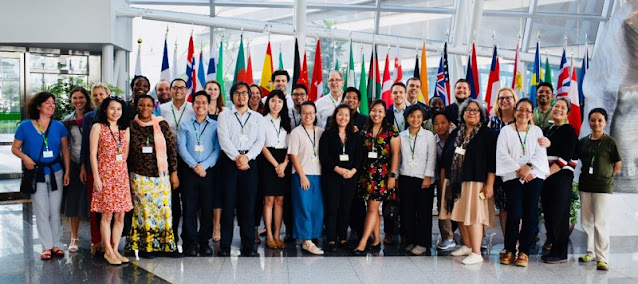Brief Information on the Green Climate Fund (GCF)
 |
| Green Climate Fund Secretariat, Songdo, Republic of Korea |
The decision to establish the Green Climate Fund (GCF) as an official financial mechanism of the UNFCCC (GCF functions within the framework of UNFCCC but is independent) took place during COP16 in 2010. The Transitional Committee developed the Governing Instrument, which addressed essential features such as objectives, guiding principles, and governance.
In 2014, GCF raised 10.3 billion dollars, and in May 2015, the Fund was fully operational. The GCF aims to become the largest funding institution for climate projects (low-emissions and climate-resilient) while supporting the global fight against climate change, especially in vulnerable nations and developing countries. The GCF receives funds from both developing and developed countries, philanthropic foundations, and private sector companies in grants, loans, and capital.
The GCF is managing social and environmental risks and mainstream gender and promotes the rights of indigenous peoples with hastily.
The GCF is run by the Board, Secretariat, The Trustee, UNFCCC, its accredited observers, including CSOs and IP groups. Decisions are made by the Board that comprises 24 members that equally represent developing and developed countries. The Secretariat is responsible for the Fund’s day-to-day activities. To support Secretariat’s work, GCF has hired consultants and specialists.
The Trustee administers the resource; the World Bank has been a Trustee since 2010. Two “active observers” (and two alternates each) who represent developing and developed country civil society organizations respectively. They can intervene and express concerns during the GCF Board meeting. Civil society groups and the private sector have no formal roles, but the Fund values their input, proposals, and concerns, which have influenced some Board’s decisions.
Instead of directly implementing and managing climate projects, the GCF works with Accredited Entities (AEs) to execute that. To work with GCF, AEs have to go through the rigorous accreditation process. To access the Fund, there are two things Governments, organizations, and private sectors can do, apply for accreditation or team up with AEs, which can channel funds. Direct Access Entities (DAEs) approved by the NDAs from developing countries can access funds directly. Since International Access Entities (IAEs) like UN Agencies, have expertise and resources in climate projects, they don’t need NDA approval.
 |
| Civil Society Organizations and Indigenous People Groups |
GCF’s Accredited Entities
& Organizations
Civil Society Organizations (CSOs) and Private Sector Organizations
(PSOs) regarded as “partners” in GCF operations. Therefore CSOs and PSOs can
take part in GCF Board Meetings as accredited OBSERVERS. CSOs are from both
developed and developing countries and share a common goal that the groups
which are affected by climate change are considered when GCF is carrying out
programs and projects.
The CSOs and IPs observe the GCF Board meetings through the telecast
in an overflow room. During the meeting, CSO observers take notes, monitor the
agenda item, and focus on the Board implementations through inputs from groups
and communities.
Unfortunately, Civil Society Organizations have been facing a
challenging struggle for inclusive and essential participation in GCF
activities. For example, there is limited access to Board documents and
decisions between meetings and information about projects in the pipeline.
However, the issues of information disclosure and accessibility have been addressed
continuously.
When it comes to the projects, GCF does not implement projects and
programs in the countries directly; the Fund works with Accredited
Entities. Public, private, NGO,
sub-national, national, regional, international sectors can apply as an accredited entity, as long as they meet all the requirements.
Direct Access Entities are sub-national, national, or regional
organizations and required to be appointed by developing country National
Designated Authority (NDAs)/focal points (contact point of a country with the
GCF and interfaces between country and GCF and oversight authority on GCF
matters). As for International Access Entities, they don’t need to be nominated
by NDAs or focal points, and they usually include the UN agencies, development
banks, financial and regional institutions.
See more information about the Green Climate Fund below:
https://www.greenclimate.fund/about
Prepared by: Andra
Vitola Koranteng
Disclaimer: The contents of this summary is based on the webinar series conducted by the GCF-CSOs
Comments
Post a Comment